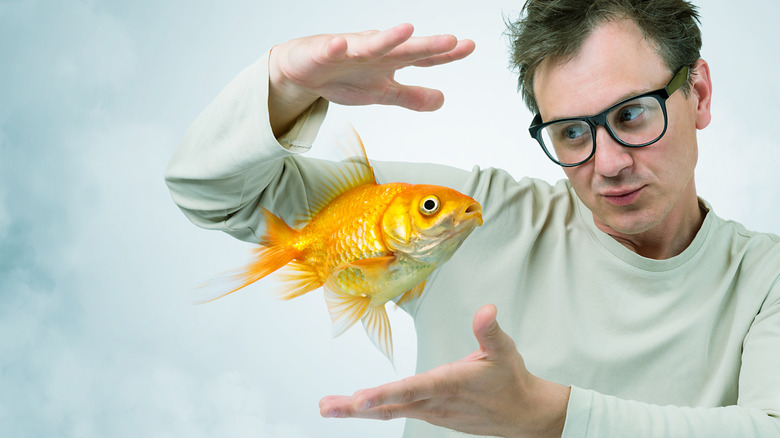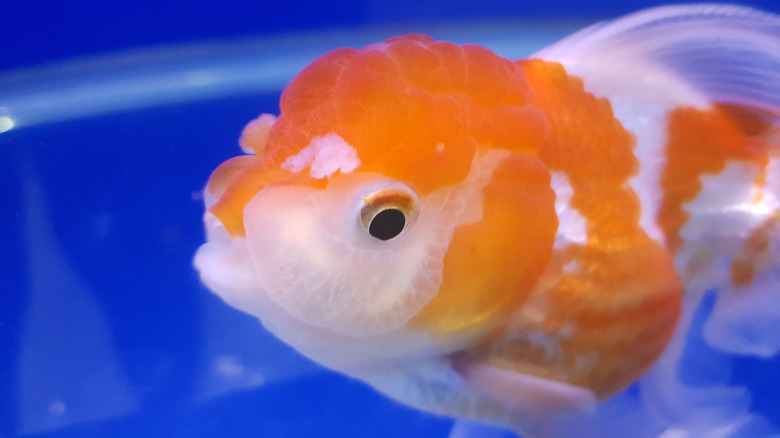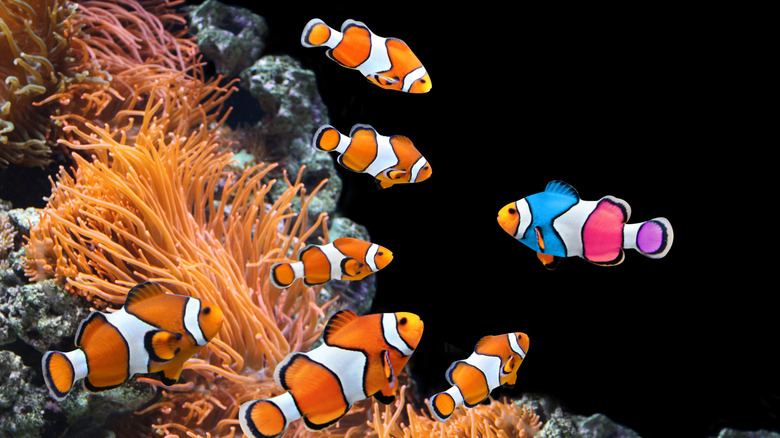Well Actually, Goldfish Don't Have Three-Second Memories
If you've ever forgotten something shortly after learning it, you may have been told you have the "memory of a goldfish" — and it probably wasn't meant as a compliment. The classic idiomatic insult plays on the common belief that goldfish have short memories. But unbeknownst to most, it's a belief that's entirely false.
In fact, the forgetful fish myth can be found all over the globe in various forms. Dr. Culum Brown, who has been called the "champion of fish intelligence," told Live Science that the belief pops up "wherever you go in the world." And while the type of fish and the timespan of its memory may vary from culture to culture, the core misconception is the same. Fish in general have a reputation for forgetfulness and low intelligence.
Many animals are smarter than we often think, and it's high time to consider adding fish to the list. Not only do goldfish memories last much longer than three seconds, they're actually exceptionally strong. Dr. Brown has pointed out how goldfish are often the preferred test subjects for animal cognition studies thanks to their above-average intelligence and memory skills (you can run a goldfish experiment, too). Such studies have demonstrated goldfishes' abilities to recall memories hours, days, and weeks later, with some evidence suggesting those little goldfish brains can store certain information for years. The methods and disciplines used to record such observations vary, but they all point to the same fact: fish are quite good at remembering.
From short-term to long-term: The excellent memory of goldfish
Goldfish have both short-term and long-term memory. Basically, short-term memories are used for solving immediate tasks, like following the scent trail of food. Long-term memories are used for recalling past experiences, like a nasty encounter with a net. Goldfish won't remember picture-perfect specifics, but their memories nonetheless retain the information that could be useful for survival.
Studies suggest that goldfish have strengths in both types. In one example of short-term memory, a team at Oxford publishing in Proceedings of the Royal Society B demonstrated goldfishes' ability to remember distances over short periods of time. The team allowed the fish to swim a certain distance away before giving it a cue once it reached a distance marker. If the fish then returned to the start, it was given a treat. But once the team stopped giving cues, the fish still swam to the distance markers and back to the starting spot, expecting the reward. Apparently, goldfish can retain memories of specific distances or landmarks — at least as long as there's a tasty reward on the line.
Long-term memory skills in goldfish aren't as refined as those in human beings, but they're irrefutably present nonetheless. Many of us have seen how pet goldfish can remember what time of day is feeding time, and goldfish often recall on which side of the tank food was dispensed the day before. But that's just the tip of the iceberg.
In experiments where goldfish were trained to push paddles to dispense food, the goldfish showed a preference for the food-dispensing paddles days after the tests concluded. In others, goldfish retained the mental maps of mazes after several months. There's even evidence that goldfish can recognize other individuals after long periods apart — though goldfishes' ability to remember names hasn't been tested.
Goldfish aren't the only fish with good memories
Goldfish aren't outliers in the fish world. Many experts argue that we've underestimated the intelligence and memory skills of fish in general. And that intelligence includes a strong ability to learn and to remember. According to Dr. Brown, over the past 60 years, a bounty of evidence has emerged to strengthen the claim.
For example, one research team from Canada whose results are published in Frontiers in Behavioral Neuroscience dispensed food rewards to African cichlids from a specific area in the aquarium. Then, the team moved the school to a different tank for 12 days. When the African cichlids were reintroduced to the original tank, they swam to the location where the food had been dispensed 12 days prior.
A 2016 study demonstrated fishes' strength in short-term memory. Researchers at the University of Padova in Italy ran the species Poecilia reticulata (the common guppy) through maze tests. With each subsequent trial, individuals completed the maze faster and with fewer errors. The results suggest those tiny pebble-sized brains could not only remember the path, but they could also learn from trial and error.
Another study published in 2019 by Swiss researchers demonstrated the capacity of one species of cleaner fish to remember the unpleasant experience of getting scooped up from its habitat a full 11 months later. In 2015, the research team captured a population of Labroides dimidiatus using nets for use in laboratory experiments. After collecting their data, the researchers returned the fish to the same spot in their natural habitat. Eleven months passed, and when the researchers came back a second time, half of the cleaner fish went into hiding at the sight of the nets. Apparently, you can't fool some fish twice.


